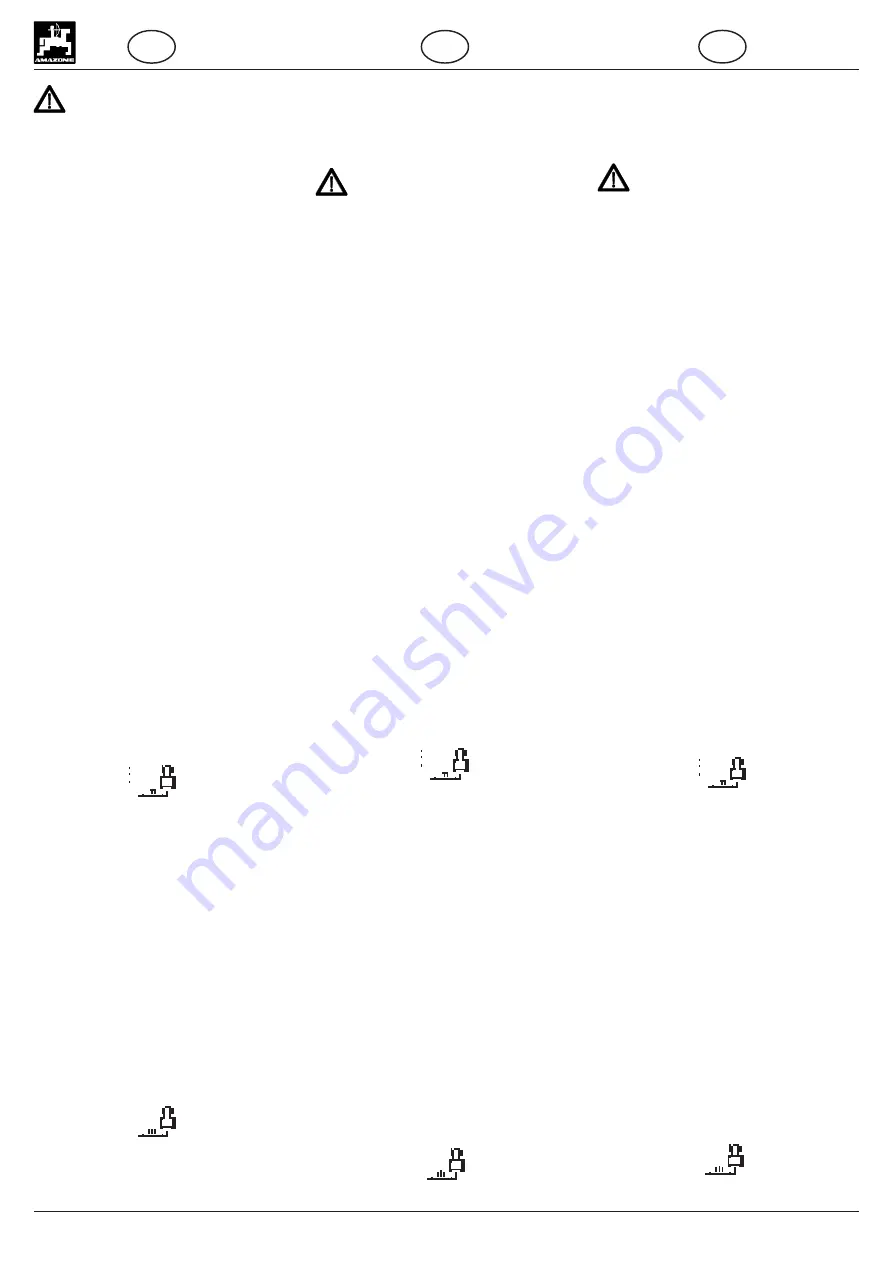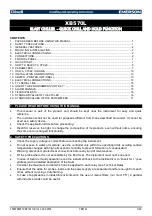
7
08.01 Limiter X
GB
F
NL
4
Kant- en randstrooien
Kantstrooien volgens de milieu-
norm (Fig.2):
(op ½ rijspoorafstand)
Het aangrenzend perceel is een weg of
oppervlakte water. Er mag geen
kunstmest over de perceelgrens wor-
den geworpen.
Om te voorkomen, dat binnen het
perceel teveel kunstmest wordt
gestrooid, moet de strooihoeveelheid
naar de grens van het perceel
gereduceerd worden. Voor de
perceelgrens wordt in geringe mate
onderbemest.
Dit kantstrooisysteem voldoet aan de
eisen van de milieuverordening.
Symbolen voor kantstrooien:
Randstrooien (Fig.3):
(op ½ rijspoorafstand)
Het aangrenzend perceel wordt voor
landbouwdoeleinden gebruikt. Hierbij is
het toegestaan dat een geringe
hoeveelheid kunstmest over de
perceelgrens wordt geworpen.
De verdeling van de kunstmest in het
veld is ook op de rand van het perceel
nagenoeg gelijk aan de ingestelde
afgifte. Een geringe hoeveelheid
kunstmest wordt over de grens van het
perceel geworpen
Symbool voor randstrooien:
Voor het grensstrooien moet de
touwconstructie weer aan de scharnier-
arm worden bevestigd.
Voordat de touwconstructie
wordt aangebracht moeten de
schuiven van de
trechteropeningen worden
gesloten en door het sluiten
van de kogelkranen worden
geborgd. Voor de stand van de
kogelkranen zie fig. 17.
4
Epandage en limite et
en bordure
Epandage en limite (Fig.2):
(à 1/2 distance de la largeur de
jalonnage)
La parcelle est bordée d’une route ou
d’un plan d’eau. Aucun engrais ne doit
être jeté au delà de la lisière du champ.
Pour qu’il n’y ait pas de surfertilisation
à l’intérieur du champ, il faut que la
quantité épandue côté limite soit réduite.
Il en résulte une fertilisation plus faible
avant la limite de champ.
Le processus d’épandage en limite
correspond aux exigences du décret
d’épandage d’engrais.
Symbole pour l’épandage en limite:
Epandage en bordure (Fig.3):
(à 1/2 distance de la largeur de
jalonnage)
La parcelle est bordée d’une surface
agricole utilisée. On peut tolérer qu’une
faible quantité d’engrais soit jetée au
delà de la lisière du champ.
La répartition de l’engrais à l’intérieur
du champ se situe toujours proche de
la quantité nominale, même en bordure
du champ. Une petite quantité d’engrais
sera jetée au delà de la lisière du
champ.
Symbole pour l’épandage en bordure:
Pour l’épandage en limite, la corde doit
être fixée sur la patte de fixation
articulée.
Avant de poser la corde,
fermez les ouvertures de la
cuve par l’entremise de la
trappe puis fermez les robinets
à boisseau sphériques pour
plus de sûreté. Position des
robinets à boisseau sphérique,
voir Fig.17.
4
Eco-border and
normal-border
spreading
Eco-border spreading according to
fertiliser application decree (Fig.2):
(with 1/2 tramline distance)
The adjacent area is a road or a water.
No fertiliser may be thrown beyond the
field’s boundary.
In order to avoid an over-fertilising inside
the field, the spread rate thrown towards
the boundary must be reduced. This
results in only a little over-fertilising in
front the field’s boundary.
The boundary spreading corresponds
to the requirements of the fertiliser
application decree.
Symbol for eco-border spreading:
Normal-border spreading (Fig.3):
(with 1/2 tramline distance)
The adjacent area is an arable field. A
small amount of fertiliser being thrown
beyond the field’s border may be
tolerated.
The fertiliser distribution inside the field
is still near the rated quantity at the
field’s border. A small amount of fertiliser
will be thrown beyond the field’s border.
Symbol for normal-border spreading:
Before fitting the cordage close
the hopper openings with the
aid of the shutter and secure
by closing the ball taps. For
ball tap position, please refer
to Fig. 17.








































